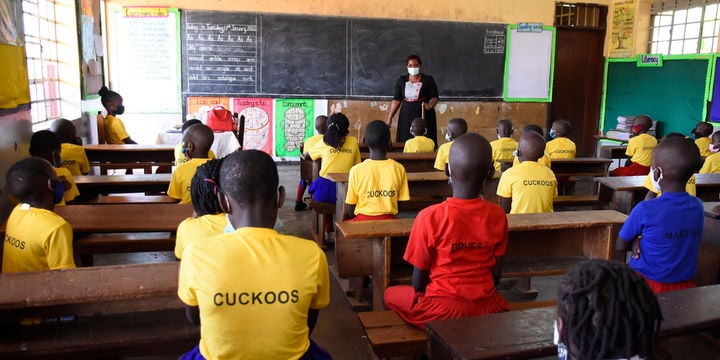Prime
Over 900 schools register for new curriculum assessment

Pupils attend a class at Buganda Road Primary School on January 11, 2022. Government through Directorate of Industrial Training (DIT) has revealed that 910 private and government schools have so far registered for new lower secondary curriculum assessment exercise which is expected to kick off next year. PHOTO/ISAAC KASAMANI
What you need to know:
- In 2020, the Ministry of Education and Sports introduced the curriculum, which focuses on skills and competencies of students unlike the old curriculum that was more theoretical.
- The acting Executive Director of DIT, Mr Patrick Byakatonda, said students pursuing vocational subjects in Seniors Three and Four will acquire a Competence Certification of Level 1 on the Uganda Vocational Qualifications Framework (UVQF)
Government through Directorate of Industrial Training (DIT) has revealed that 910 private and government schools have so far registered for new lower secondary curriculum assessment exercise which is expected to kick off next year.
In 2020, the Ministry of Education and Sports introduced the curriculum, which focuses on skills and competencies of students unlike the old curriculum that was more theoretical.
The implementation of the curriculum is spearheaded by the National Curriculum Development Centre (NCDC) which trains teachers and the education standards department, which is required to monitor the exercise.
Speaking to the media during a meeting with the assessors from Directorate of Education Standards (DES) in Kampala yesterday, the acting Executive Director of DIT, Mr Patrick Byakatonda, said students pursuing vocational subjects in Seniors Three and Four will acquire a Competence Certification of Level 1 on the Uganda Vocational Qualifications Framework (UVQF).
“The main thing is ensuring that students actually have the skills, and not do the certification only in order to get the paper. Those who cannot enroll for A-Level after Senior Four can apply for jobs with the DIT certification because it is recognised by International Organisation for Standardisation,” he said
He added that the exercise will start with Senior Threes ( now Senior Twos).
“ and since it’s a process … learners have to perform projects in the presence of an assessor... We have started on the validation process of the assessors and so far 929 assessors are in our database. We want to make sure that we cover up all the 5,000 schools which are implementing the new curriculum with the ration of one assessor per 20 learners,” he said.
The assistant commissioner in the department of teachers’ Instructor and Training from the Ministry of Education, Mr Joseph Kikomeko, said government is ready to work with all stakeholders to see that the new curriculum is well-implemented in every secondary school.
Mr Kikomeko said: “Since it’s a compulsory curriculum, all schools are supposed to implement the new curriculum to prepare for assessment where the UNEB takes 80 percent of the results and the 20 percent comes from the school projects.”
Ms Sania Naggadya, the director of studies from Janani Luwum schools Kabalaga, said schools have a challenge of lack of requirements needed to teach learners.
“Being more of a learners-centred curriculum, there is need to have internet, text books to do research and materials to practice their projects. Each learner is supposed to have two projects per term,” she said.
Ms Naggadya said there is also a need to train teachers to adopt to the new curriculum.
New curriculum
The new curriculum requires Senior One to study from 8am up to 2:30pm, while Seniors Two and Three will go up to 4pm or 5pm.
It will allow students to study only 12 subjects in Seniors One and Two, with 11 of these being compulsory and one elective.
The compulsory subjects are English Language, Mathematics, History, Geography, Physics, Biology, Chemistry, Physical Education, Religious Education and Kiswahili.
The optional subjects in the new lower curriculum are categorised as vocational and these include Agriculture, ICT, Literature in English, Art and Design, and Performing Arts, Technology and Design, Nutrition and Food Technology, and Foreign Languages (French, Latin, Arabic, Chinese).




